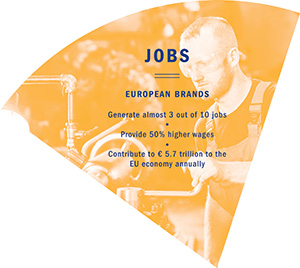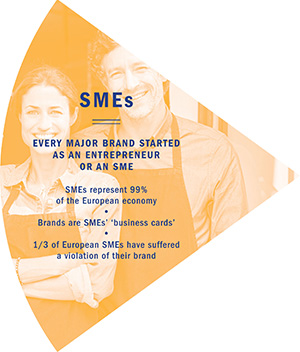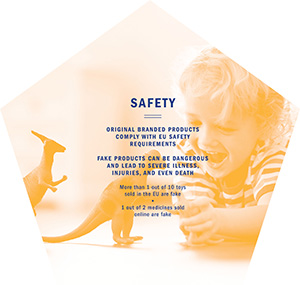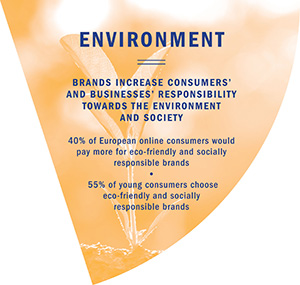INTA Issues Brands Manifesto to Raise Awareness Beyond the Intellectual Property ‘Bubble’
Published: October 15, 2019
What do European brands represent? How do they contribute to the environment or protect children’s safety? In a nutshell, why are they important to you?




These are some of the questions that INTA is answering in its just-released Brands Manifesto. INTA developed the Manifesto to serve as a practical tool to raise awareness among European decision makers about what brands stand for and what benefit they generate for European society as a whole.
With the background of the European elections of May 23‒26, 2019, the Brands Manifesto was born out of necessity, as brands and intellectual property (IP) professionals try to reach beyond the IP “bubble” and raise awareness among high-level European Union decision makers and the general public.
Therefore, INTA chose to structure the Brands Manifesto using five keywords-trust, jobs, SMEs, safety, and environment-that resonate among European citizens, as attested by the results of the European elections that saw, among other outcomes, the rise of climate change as a top political issue as well as the unprecedented mobilization of European youth.
- Trust: Trust is the most obvious link between brands and consumers. Brands stand for the promise of consistent quality, enabling consumers to make informed and quicker purchasing choices. When faced with shelves packed with countless variations of the same product category, consumers will opt for the brands they trust, without having to analyze the different products first. Brands offer that knowledge and comfort, and may also provide an anchor with local communities.
- Jobs: Building on data from the European Union Intellectual Property Office (EUIPO), INTA is showcasing the contributions of EU brands to the economy: specifically, they generate 3 out of 10 jobs, provide 50 percent higher wages, and contribute €5.7 trillion annually to the economy.
- SMEs: Often described as the backbone of the EU economy (they make up 99 percent of it), small and medium-sized enterprises (SMEs) are key because every major brand or company was started by an entrepreneur. Think about Microsoft’s Bill Gates creating his first computer in his garage or Mark Zuckerberg developing Facebook in his dorm. None of this could have happened without IP protection, which helps differentiate SMEs’ products and services from those of other competitors in the market. Brands are a company’s business card-the way they are known to the outside world. But one out of three SMEs faces a violation of its IP rights, and SMEs often lack the knowledge or resources-human and/or financial–
to protect their brand. - Safety: The safety aspect of brand protection, although unfortunately less known, is nonetheless a concerning one: while genuine branded products have to comply with EU safety requirements, counterfeit products, by their nature, do not. Therefore, fakes can be hazardous to the health and safety of EU citizens and lead to severe illness, injuries, and even death. This issue is affecting every sector. Think about fake toys (1 out of 10 of toys in the EU) with lead paint that children put in their mouths, or a fake airbag that explodes while a car is driving on the highway.
- Environment: How do brands contribute to environmental protection and the fight against climate change, a key concern of European citizens and, notably, the youth? The link between brands and the environment is clear: 40 percent of European online consumers would pay more for brands that are eco-friendly and socially responsible; and 55 percent of young consumers choose to buy brands with those same values. Brand reputation is key. Consumers’ increasingly conscious purchasing choices prompt brands to take responsible actions involving the environment and society.
By committing to brand protection, EU businesses, decision makers, and the public protect major aspects of the EU identity: the EU economy and jobs, SMEs, consumers’ health and safety, and the environment.
INTA is using the Brands Manifesto to support and promote INTA’s six concrete recommendations for IP priorities for the new EU Parliament and European Commission’s 2019-2024 mandate:
- Create a high-level IP Coordinator’s position at the European Commission (which holds the monopoly on legislative initiatives);
- Position the EU as an IP champion on the international scene;
- Launch and support an EU-wide IP education campaign targeting consumers, youngsters, SMEs, and policy makers;
- On the legislative front, initiate EU legislative reform on designs and work on the implementation of the EU trademark system;
- Ensure that the EUIPO continues providing a high-quality and efficient public service to its users; and
- Promote the creation of national IP Rights Centers and specialized IP units within police departments in EU member states for IP enforcement.
INTA has already started to distribute the Brands Manifesto to EU policy makers (the European Commission; European Parliament; and the EUIPO) and will continue to communicate its messages to stakeholders and the public through social media and other means.
INTA’s Europe Representative Office, based in Brussels, Belgium, represents the Association’s 1,800+ members across Europe (including those in EU and non-EU member states, and Russia and the Commonwealth of Independent States). Working in collaboration with staff at INTA’s headquarters in New York City, the Europe Representative Office leads the Association’s policy, membership, marketing, and communications initiatives throughout the region. To learn more about INTA’s activities in Europe, please contact INTA Chief Representative Officer-Europe Hélène Nicora at [email protected] and follow us on Twitter at @INTABrussels. 
Although every effort has been made to verify the accuracy of items in the INTA Bulletin, readers are urged to check independently on matters of specific concern or interest.
© 2019 International Trademark Association